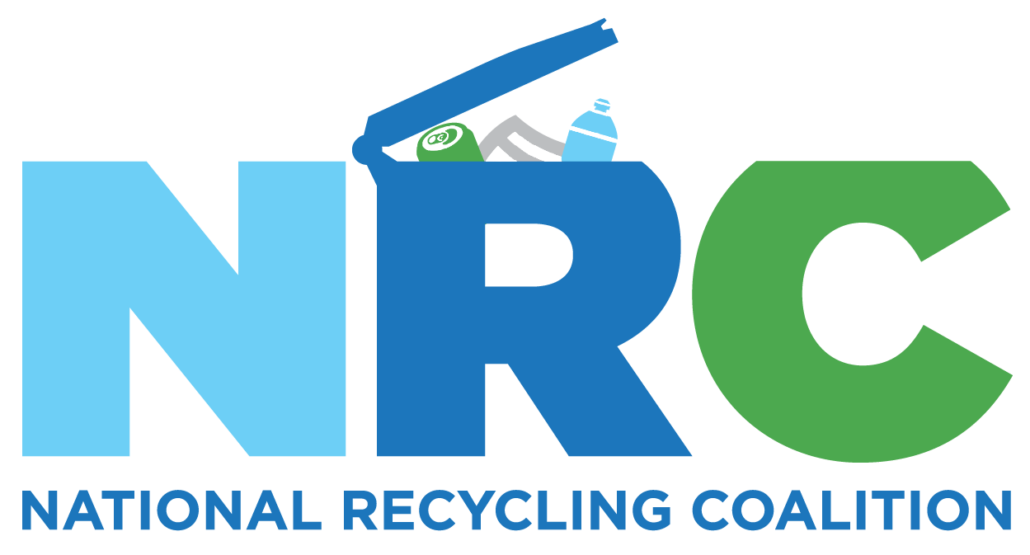RONA and NRC have combined into One Strong Voice for Sustainable Management of Resources: A message from NRC President and CEO Mark Lichtenstein
In a recent letter to me, Marjie Griek, Chair of the Recycling Organizations of North America, correctly recalled that in 2009 “there was grave concern on the part of the national recycling community that the National Recycling Coalition would not be able to continue to function as a strong representative of the recycling” industry (broadly defined). I’m sure many of you join with me in vivid recollection about those frenetic and dark days where talks of mergers and bankruptcy were rampant. Read More [expand title=”Learn More”]
Those long four years ago, a bolus of folks – including individuals relatively unknowing about the NRC, others who were once stalwarts for the organization, but over time slipped away from it (like me), and many very active members with the Coalition at the time – came together to form a cohesive Save the NRC Committee. There is something to be said about this headless, but prodigious group, forging ahead with a singular goal of clarity. That is…
…the laudable, original vision for this venerable, national organization – one that should operate above reproach, secure itself from real or perceived undue influence, effectively engage the matrixed, complex, diverse, and numerous stakeholders of our “industry,” and bring it all together in one house to accelerate sustainable resource management – is worthy of not simply being saved, but of increased investment of effort leading it to its apotheosis.
Amy Perlmutter, Bob Gedert, Pete Grogan, the late Pat Franklin, NRC Founder Cliff Case, a few current members of the NRC Board at the time like Fran McPoland, David Refkin, Curt Bucey, and Melinda Uerling, a plethora of NRC past-presidents and board members, numerous representatives of the Recycling Organizations Council, and many others, including the current RONA leaders, forged ahead with the Herculean effort.
Some, and I was at the table for a portion of the nascent discussions, also recognized there may have to be an alternative reality, considering the breadth of NRC’s challenge, and thus, the potential that the Save the NRC Committee’s efforts may in the end be unsuccessful. There needed to be a Plan B. That alternative plan – safety net, if you will – was to become RONA.
Admittedly, during the 2010 timeframe with the NRC slowly on the mend and with, most likely, a misplaced confidence, I personally expended a lot of internal energy on my belief that RONA and the NRC needed to become one organization as soon as possible. The passage of time has offered me the ability sit in a retrospective position. I now know I was wrong to push so hard back then. The NRC was still deep in the woods, and RONA’s leaders were keeping the home fires burning. I was blind to the light coming from that hearth, oh-so-close ahead. They were smart to be sure the NRC was of sound mind and body, before agreeing to our request for a slow-dance.
As Marjie once again correctly assesses, in 2012, “when it became clear that the NRC would survive and thrive, boards of both organizations and their members agreed in spirit to join the two organizations together. [We] developed a document entitled Guiding Principles and Strategies that clearly stated shared goals and ideals, and mechanisms for reaching those.” Thus, here we are today.
How unfair it would be for me to imply that all RONA was doing during that time period was to play a waiting game, hinging its fate on NRC’s progress trekking down its own path. Au contraire! They moved forward with aplomb, and helped develop the National Standards Certification Board that created and oversees the National Standards Program for Sustainable Resource Management. (Work by this board is ongoing and shall continue under the NRC umbrella.) They established RONA U, bringing together campuses across the nation, and they launched other important initiatives as well.
I personally applaud what RONA’s members, board, and other leaders have been able to accomplish in a relatively short time frame. Mick Barry, Gary Bilbro, Jack DeBell, John Frederick, Marjie, and Gary Liss in particular deserve much kudos. I have no doubt that their efforts helped move the ball on materials recovery in a big way.
The coming-together of these two proud organizations puts more arrows in the NRC quiver. We are excited about the work of the National Standards Certification Board. In addition, RONA U, and now, the newly formed NRC Campus Council (resulting from this process) resonate with me personally, as I was there with Jack DeBell and others when the NRC formed its first College and University Recycling Council in the 1990s. The NRC will once again have a presence in this very important sector with our new Campus Council continuing RONA U’s work in ways that remain distinct from other college and university organizations in the recycling field – we will strengthen connections with those other like-minded organizations – and it will focus on better linkages between higher education and businesses.
The NRC family also is strengthened through this partnership by very likely soon having Gary, Jack, John, Marjie, and Gary join Mick and the rest of the NRC leadership as new members of our board (this action is slated to take place on August 27th here in Louisville). These are great leaders the new NRC is going to be tapping into. The people coalescing – and let’s not forget, these are not faceless and nameless organizations, it’s all about the people! – the leaders from RONA, the new NRC board soon to be elected, the ROC and all the ROs who are coming to the table in great numbers-this is what it’s going to take for the NRC accelerate to its next phase. Of that, I have no doubt!
It should be self-evident by now that I’m extremely excited about the opportunity this “coming-together” represents for moving sustainable materials and sustainable resources management to the next level, particularly throughout the Americas. I’m overflowing with positive energy, and I see this energy manifesting itself with other colleagues in this new, and once again, reinvigorated NRC. All of us are ready to put this newfound energy into further action.
Here and across the Globe, we continue to have some strategic and difficult challenges relating to implementing more sustainable approaches to managing our discards, but also embodied within those challenges are great opportunities-opportunities for job creation, more social equity, and acceleration toward a society where the concept of “waste” is an outlier.
These are two seemingly small NGOs, but this constructive action, I predict, will have serious, positive, and over the long-term, monumental reverberations.
I hope to see you all here in Louisville at our Annual Meeting tomorrow, August 26th, to hear more positive news about the state of the NRC.
My very best to you all,
Mark Lichtenstein
President and CEO[/expand]

